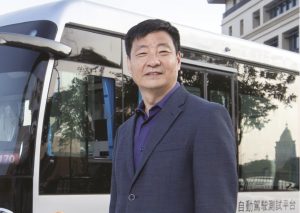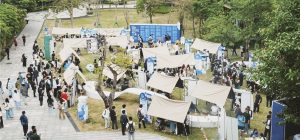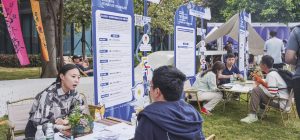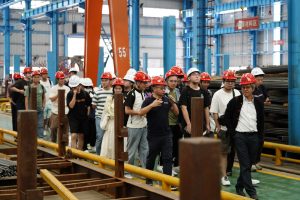As technological powerhouses lead the charge into Industrial Revolution 5.0—where big data models, the Internet of Things, and artificial intelligence are rapidly transforming industry—a wave of profound change is reshaping our world. This transformation presents both significant challenges and exciting opportunities for science, technology, and engineering education. In response, the University of Macau (UM) is reinventing engineering education. By fostering interdisciplinary curriculum innovation and integrating artificial intelligence into courses, UM is aligning its engineering programmes with the evolving demands of industry. The university is committed to developing high-quality engineering professionals equipped to meet the challenges of the new era. Through these efforts, UM aims to contribute to the industrial transformation of the Guangdong-Hong Kong-Macao Greater Bay Area, particularly Macao and the Guangdong-Macao In-depth Cooperation Zone in Hengqin, and to inject new momentum into regional development.
Diverse Engineering Education System
UM’s engineering education is structured across several departments, including the Department of Civil and Environmental Engineering, Department of Electrical and Computer Engineering, and Department of Electromechanical Engineering. These departments offer a full range of degree programmes, from undergraduate to doctoral levels. The undergraduate programmes are designed to provide students with a strong foundation in engineering, while the postgraduate programmes focus on deepening professional knowledge and practical skills. Master of Science (MSc) programmes are available in the fields of civil engineering, construction project management, electrical and computer engineering, robotics and autonomous systems, and electromechanical engineering.
Integrating AI into Curricula
In response to rapid advancements in emerging technologies, UM is enhancing its engineering education system, with interdisciplinary collaboration as a key strategy. The Faculty of Science and Technology (FST), which leads UM’s engineering education, enriches programme curricula by placing greater emphasis on digitisation, informatisation, and intelligentisation. AI integration and practical AI applications are also systematically incorporated into courses at all levels. These efforts ensure that the educational offerings meet the diverse learning needs and proficiency levels of students. Moreover, all engineering departments are exploring ways to integrate AI and data science into curricula.
In civil engineering, for example, FST has launched an MSc programme in construction project management in response to the increasing use of digital twin-based smart construction technologies. This programme equips students with the skills to apply AI algorithms for project schedule prediction and resource allocation optimisation, enabling them to manage engineering projects effectively throughout their lifecycle. Similarly, the MSc programme in electromechanical engineering focuses on smart manufacturing and robotics, leveraging AI to improve equipment fault diagnosis and predictive maintenance.
To stay at the forefront of technological advancements, FST is also planning to establish new departments in microelectronics, artificial intelligence, and robotics. The faculty is committed to deepening the integration of engineering education and cutting-edge technologies.
Building Professional Knowledge and Practical Skills Through Progressive Training
UM’s engineering education is closely aligned with industry needs. The university emphasises the development of strong scientific literacy, an innovative spirit, and hands-on practical skills—essential qualities for every engineering student.
‘To nurture students into exceptional engineering professionals, we must develop their ability to integrate scientific knowledge and engineering expertise, while fostering their innovative and critical thinking,’ emphasises FST Dean Prof Xu Cheng-Zhong as he discusses the essentials of engineering education. He highlights the importance of developing students’ practical skills, a focus that is deeply embedded in UM’s engineering education system. All courses and learning activities are designed to provide students with ample opportunities to apply theoretical knowledge in real-world scenarios. Through various laboratory courses and hands-on projects, such as engaging undergraduates in AI-based mini-engineering projects, students significantly enhance their problem-solving skills.
Prof Xu also shares the design of postgraduate engineering programmes: ‘From student recruitment and enrolment to coursework, lab work, internship, and career planning, we offer comprehensive support at every step.’ To help new students adapt to university life and build a sense of belonging, FST organises orientation activities at the start of each semester. Additionally, financial support is widely available—52.4 per cent of master’s students receive scholarships, teaching assistantships, or research assistantships—ensuring that students can focus on their academic studies. A strong emphasis is placed on hands-on learning, with laboratory components integrated into the core courses of every postgraduate engineering programme. A standout feature is the Showcase Laboratory, which provides students with a platform to apply theoretical knowledge to real-world situations. To deepen students’ understanding of industry practices, the faculty regularly hosts industry seminar series. These events allow students to learn from professionals who share real-world case studies and discuss emerging trends. The two-year master’s programmes also offer flexibility in graduation requirements, enabling students to choose between a project report or an internship instead of a thesis. This innovative approach is designed to enhance students’ practical skills while fostering their ability to think creatively and solve real-world problems.
International Exchange and Collaboration
UM attaches importance to promoting international academic exchange and research collaboration. Under the coordination of FST, UM has established several joint training programmes in engineering with overseas universities. These include a ‘2+2’ dual PhD degree programme with the University of Lisbon and ‘1+3’ master’s-PhD programmes in collaboration with institutions such as Imperial College London. In addition, UM provides students with opportunities to attend short-term courses abroad, participate in international academic forums, and engage with renowned scholars from around the world. These initiatives not only foster international academic exchange, but also broaden students’ international horizons.
Prof Xu notes that in recent years, a growing number of graduates from world-renowned universities have joined FST. Currently, over 80 per cent of FST’s academic staff hold degrees from prestigious international institutions. These faculty members bring exceptional teaching expertise and extensive research experience, driving significant progress in both teaching and research. Over the past 12 years, the number of academic papers published by FST has tripled, with 85.7 per cent of them appearing in SCI Q1 and Q2 journals, reflecting the faculty’s strong research capabilities. In the Times Higher Education (THE) World University Rankings by Subject 2025, UM’s engineering programmes were ranked 126th globally. Additionally, the university’s engineering discipline is ranked among the top one per cent in the Essential Science Indicators (ESI) database.
Empowering Students for Success in Advanced Studies and the Job Market
UM’s engineering graduates excel in both advanced academic pursuits and professional careers. Many who choose to pursue further education gain admission to prestigious universities, such as Imperial College London, the University of Edinburgh, the University of Hong Kong, the University of Melbourne, the University of Southern California, and the National University of Singapore.
On the employment front, FST has established strong partnerships with over 60 enterprises, including Gree Electric, Nam Kwong Group, and GAC Group, as well as various government departments. These partnerships provide students with valuable internship opportunities while enabling employers to recruit highly qualified professionals. In March this year, FST organised the first UM FST GBA T&E Career and Internship Fair in the Cooperation Zone in Hengqin. Nearly 30 companies from the Greater Bay Area participated, offering about 1,000 job opportunities in technology and engineering. The fair significantly boosted students’ competitiveness in the job market. According to Prof Xu, nearly half of FST’s doctoral graduates secure academic positions at higher education institutions after graduation, while master’s graduates earn an average monthly starting salary of RMB 23,000. These achievements underscore the high quality of FST’s education and the strong competitiveness of its graduates in the market.
It is worth noting that under the certification and registration system for architecture and urban planning professionals established by the Macao SAR Government, individuals with a degree in civil engineering, environmental engineering, electrical engineering, or electromechanical engineering can become registered engineers after completing internships and passing the required examinations. Notably, UM graduates constitute about 80 per cent of Macao’s electromechanical engineers, 50 per cent of its electrical engineers, and 25 per cent of its civil engineers.
Driving Industry Development in Macao and Hengqin
Amid rapid technological advancements, UM remains steadfast in its commitment to an industry-oriented approach in engineering education. The university continuously refines its education system, fosters deeper integration of engineering and artificial intelligence, strengthens faculty development, and enhances industry-academia collaboration. These initiatives aim to provide students with exceptional educational resources and practical opportunities, while cultivating high-quality professionals to support Macao’s economic diversification and the industrial development in the Cooperation Zone in Hengqin.
Text: Gigi Fan
Photo: Jack Ho, with some provided by the interviewees
English Translation: Bess Che
Source: UMagazine ISSUE 31
Related articles:
Civil Engineering Education in an Era of Transformation
Advancing Electrical and Computer Engineering Education Through Interdisciplinary Collaboration







